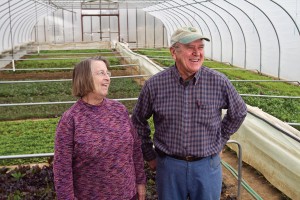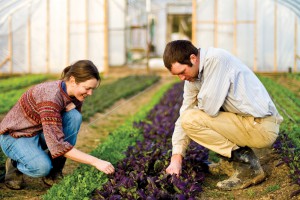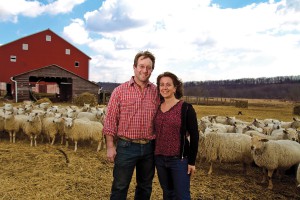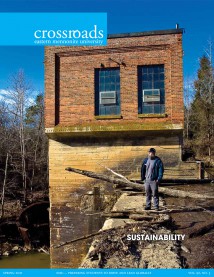
Hope and Roy L. Brubaker ’67 have been growing organic vegetables in Mifflintown, Pennsylvania, since the early 1980s. They have influenced dozens of young farmers and gardeners through their internship program, where they model "conscientious living," according to a former intern.
The latest improvement at Village Acres Farm in Mifflintown, Pennsylvania, is a new kitchen and education center where Hope and Roy L. Brubaker ’67 and plan to host cooking classes. They have been concerned lately about the health effects of poor diets. Maybe offering a crash course in cooking with fresh vegetables would be a way to help out.
There are plenty of fresh vegetables to be had at Village Acres Farm, where Roy and Hope run a weekly Community-Supported Agriculture, or CSA, program and supply a farmers cooperative that provides Washington DC and Baltimore with produce, flowers, eggs and poultry.
To keep up with all the work, the Brubakers employ several local people and host four or five farm interns each year. Over the past 15 years, several dozen interns have come and gone. Some have since started organic farms of their own, others have felt the Brubakers’ continuing influence in different ways, and either way, the little farm in Juniata County has had an outsized impact on the wider world.
In 2010, the Pennsylvania Association for Sustainable Agriculture recognized Roy’s and Hope’s influence over the years by awarding the couple the organization’s Sustainable Agriculture Leadership Award.
“[Roy and Hope] have been a real asset to that community,” says Kent Sensenig ’92, who became Village Acres’ first intern in the summer of 1993 and returned for two subsequent seasons.
Kent, who now teaches part-time in the Bible department at EMU, is working on his PhD from Fuller Theological Seminary. His dissertation includes a major focus on environmental and ecological ethics, an interest kindled at Village Acres Farm.
Kent and his wife Jennifer, also an intern at Village Acres for one summer, later worked for four seasons on an organic farm in Wisconsin. When Jennifer served as pastor of a church in Cedar Falls, Iowa, Kent ran his own CSA there for three years. (Jennifer David-Sensenig is now pastor of Community Mennonite Church in Harrisonburg.)
Jen Hess ’03 also continues to draw on her experience as a Village Acres intern in her job as services director for Goodwill Keystone Area, an organization that provides job training for adults with disabilities. One of the programs Jen works with is an organic farm and CSA.
Hess, whose favorite job at Village Acres was tying up tomato plants, and whose first accomplishment on Roy’s brand new lawn mower was crashing it, was the first services director at Goodwill Keystone Area with first-hand experience in organic farming.
“Roy and Hope taught me about conscientious living,” Hess writes. “We ate well, cooked well and lived well. The best part of every day was everyone around the dinner table at lunch and dinner … [where] a lot of great memories were created.”
Roy and Hope moved to Village Acres in 1982, after spending 15 years in East Africa with Mennonite Central Committee. While both of them worked off the farm, by the late ‘80s they’d begun growing significant amounts of produce, and a decade later, Roy began devoting his time completely to the farm after they started their CSA. It wasn’t a career choice without precedent; Roy’s parents (“oddballs,” as he puts it) had an organic farm of their own near Mifflintown, long before the concept of “organic” farming ever became widely understood.

Bethany ’01 and Micah Spicher Schonberg are protégés of Village Acres Farm. After working there as interns, the couple went on to found Plowshare Produce in McAlevy’s Fort, Pennsylvania.
One of the several new farms started by Village Acres interns is Plowshare Produce, run by Micah and Bethany Spicher Schonberg ’01 in McAlevy’s Fort, Pennsylvania. On part of Bethany parents’ farm, Micah and Bethany operate a CSA with about 70 members and grow their produce on two acres, using horses for much of the fieldwork. They say Roy and Hope have been supportive and helpful in many aspects of starting Plowshare Produce, from day-to-day matters of growing vegetables and developing their business to modeling a dedication to community service.
Their appreciation for the example set by Roy and Hope prompted Bethany and Micah to nominate Village Acres for the leadership award the Brubakers recently received.
“The Brubakers have been mentors to us … by teaching us what successful and sustainable farming looks like: strengthening our agricultural community through service to our neighbors,” wrote Bethany, in a speech she and Micah made when Roy and Hope accepted the award.
Another young farm with a long and close relationship to Village Acres is Blue Rooster Farm, run by Roy Dale Brubaker ’92 and Julie Hurst ’93, Roy and Hope’s son and daughter-in-law. While Roy Dale and Julie concentrate their efforts on pasture-raised beef and lamb, they too have been discovering the rewards of farming as a community-building activity.

A half-hour down the road from Village Acres is Blue Rooster Farm, owned by Roy Dale Brubaker ’92 and Julie Hurst ’93. The couple raises grass-fed, pasture-raised beef and lamb. Roy is also a state forester, overseeing 85,000 acres in the Michaux State Forest District (Pa.).
Sometimes, it’s a matter of practicality, like when Roy Dale and Julie and a farmer neighbor take turns feeding each other’s animals when one of them is away. And at other times, it’s a matter of emotional support – starting a farm from nothing in an isolated, rural area is challenge enough, they say, and going it alone would have been hard to imagine. Keeping close ties with Village Acres, a half-hour away, and other sustainable farmers in the area, and building ties with more immediate neighbors, have been important parts of Blue Rooster Farm’s development.
“[By doing this], you really build community, and you build it with people you might not think you’d have much in common with,” says Julie.
That’s a lesson she and Roy Dale have been learning themselves as they’ve become farmers, and it’s a lesson absorbed from her parents-in-law at Village Acres, who have been living it for decades.
“We always had an emphasis on community here,” says Roy L., pausing for a moment in the muddy barnyard on a balmy February morning, a prelude to another busy spring at Village Acres. “We see that as an important component of our farm life.”
